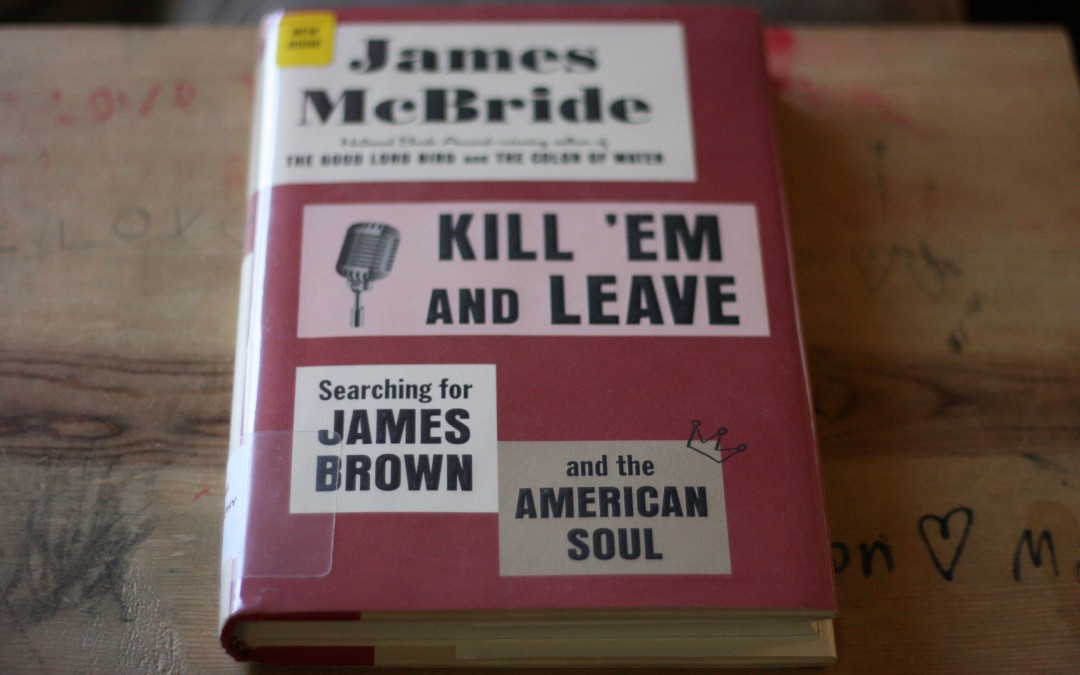Kill ‘Em and Leave: Searching for James Brown and the American Soul, by James McBride, is probably the best narrative nonfiction book I’ve read all year. I have to start by saying that I’m a huge fan of James McBride and have almost read everything he’s written. This book was interesting, humorous, truthful, smart and probing. It not only examined James Brown’s often-fabled life and the truth behind what we’ve heard to date, but it also examined the relations between blacks and whites in an honest, graceful, curious way.
Take this quote, for example:
“Such is the complexity of race relations in America’s South, where race keeps you in a kind of grid in which you never know where to step. Blacks and whites together—but not together. Living as one, but not as one. Living as family, but a dysfunctional family.”
McBride nails it. I live in the south. I know this is true.
These sorts of asides serve to make McBride’s readers trust him, and trust him they will as they make their way through the story of James Brown and a fortune that was intended to benefit poor children but never actually made it there. The book is more than just the history of James Brown. It’s the history of black music, the history of funk and soul, the history of life in the south. So many stories about James Brown have been told since the musician’s death, but none of them has been told as beautifully and as honestly as this one. McBride conducted interviews with people who had remained quiet until he got hold of them. He’s a journalist, and he gets all the way to the truth of Brown’s life and legacy. And the whole journey is fascinating.
McBride is a black musician himself, so he’d slip in asides about the state of professional musicians—like this one:
“Here’s how music history in America works: a trumpet player blows a solo in a Philly nightclub in 1945. Somebody slaps it on a record, and fifty years later that same solo is a final in a college jam department, and your kid pays $60,000 a year to take the final, while the guy who blew the solo out of his guts in the first place is deader than yesterday’s rice and beans, his family is suffering from the same social illness that created his great solo, and nobody gave two hoots about the guy when he died and nobody gives two hoots about his family now. They call that capitalism, the Way of the World, Showbiz, You Gotta Suck it Up, an upcoming Movie about Diversity, and my favorite term, Cultural History. I call it fear, and it has lived in the heart of every black American musician for the last hundred years.”
In the course of the book, McBride talks to people like Brown’s first wife, his manager, his musicians, people who knew the real James Brown. He uncovers the legal contest over Brown’s estate—a fight that has prevented any of the money Brown left for poor children in Georgia and South Carolina to actually reach them.
I first picked up a book by James McBride when his novel, The Good Lord Bird, won the National Book Award for Fiction in 2013. It’s a southern tale, just like Kill ‘Em and Leave. I knew then that I’d have to read whatever James McBride put out into the world. McBride is a master at bringing his readers into a story, whether he’s telling a fiction one or a familiar nonfiction one. He has a way with words that breathes life into the simplest of phrases and stories.
I’ve made it my mission to be like James McBride when I grow up.
I’ll leave you with one last quote from Kill ‘Em and Leave. These are the opening sentences and prove how McBride uses language to expertly draw his readers into a world they will not want to leave:
“The statue sits smack in the middle of downtown Augusta, Georgia, face high, because the old man never wanted to be standing above anybody else. He wanted to be down with the people. And as you stand before it on this deserted stretch of cheap stores and old theaters on a hot August afternoon, you say to yourself, ‘This is what they don’t teach you in journalism school’: to walk through the carcass of a ruined, destroyed life—this broken life and the one behind it, and the ones behind that—to navigate the maze of savage lawyers who lined up to feed at the carcass; to listen to the stories of the broke musicians who traveled the world in glory only to come home with a pocket full of nothing; to make sense of the so-called music experts who helped themselves to a guy’s guts and history trying to make a dollar change pockets. Everybody’s got a hustle in this world. Meanwhile the guy who made the show—he’s deader than yesterday’s beer, his legacy scattered everywhere but where he wanted it.”
I hope you’ve enjoyed this book recommendation. Be sure to visit my recommendation page if you’re interested in seeing some of my best book recommendations. If you have any books you recently read that you think I’d enjoy, don’t hesitate to get in touch. And, if you’re looking for some new books to read, stop by my starter library, where you can get a handful of my books for free.
*The books mentioned above have affiliate links attached to them, which means I’ll get a small kick-back if you click on them and purchase. But I only recommend books I enjoy reading myself. Actually, I don’t even talk about books I didn’t enjoy. I’d rather forget I ever wasted time reading them.


